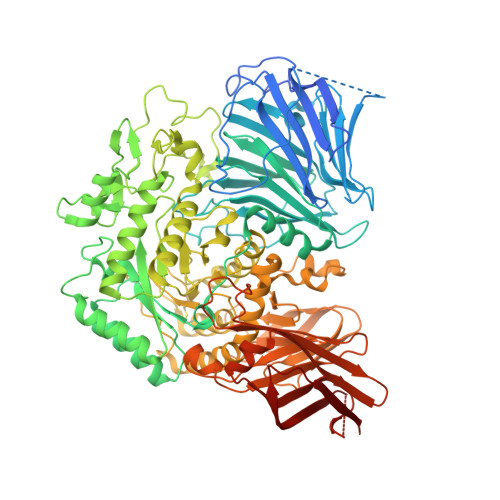Structural advantage of sugar beet alpha-glucosidase to stabilize the Michaelis complex with long-chain substrate
Tagami, T., Yamashita, K., Okuyama, M., Mori, H., Yao, M., Kimura, A.(2014) J Biological Chem 290: 1796-1803
- PubMed: 25451917
- DOI: https://doi.org/10.1074/jbc.M114.606939
- Primary Citation of Related Structures:
3WEL, 3WEM, 3WEN, 3WEO - PubMed Abstract:
The α-glucosidase from sugar beet (SBG) is an exo-type glycosidase. The enzyme has a pocket-shaped active site, but efficiently hydrolyzes longer maltooligosaccharides and soluble starch due to lower Km and higher kcat/Km for such substrates. To obtain structural insights into the mechanism governing its unique substrate specificity, a series of acarviosyl-maltooligosaccharides was employed for steady-state kinetic and structural analyses. The acarviosyl-maltooligosaccharides have a longer maltooligosaccharide moiety compared with the maltose moiety of acarbose, which is known to be the transition state analog of α-glycosidases. The clear correlation obtained between log Ki of the acarviosyl-maltooligosaccharides and log(Km/kcat) for hydrolysis of maltooligosaccharides suggests that the acarviosyl-maltooligosaccharides are transition state mimics. The crystal structure of the enzyme bound with acarviosyl-maltohexaose reveals that substrate binding at a distance from the active site is maintained largely by van der Waals interactions, with the four glucose residues at the reducing terminus of acarviosyl-maltohexaose retaining a left-handed single-helical conformation, as also observed in cycloamyloses and single helical V-amyloses. The kinetic behavior and structural features suggest that the subsite structure suitable for the stable conformation of amylose lowers the Km for long-chain substrates, which in turn is responsible for higher specificity of the longer substrates.
- From the Research Faculty of Agriculture.
Organizational Affiliation:



















